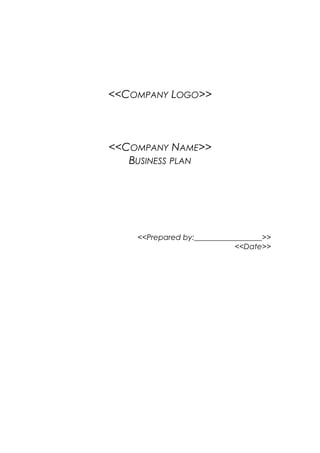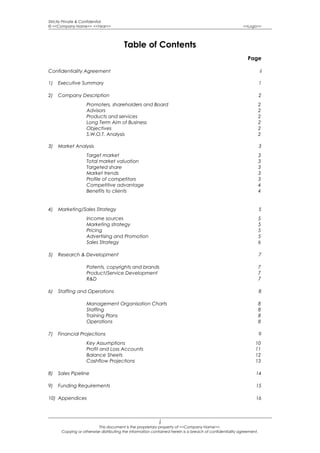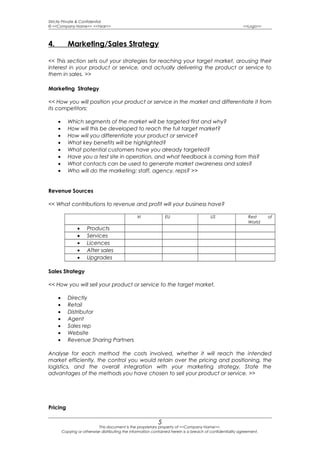Business plan
- 1. <<COMPANY LOGO>> <<COMPANY NAME>> BUSINESS PLAN <<Prepared by:__________________>> <<Date>>
- 2. Strictly Private & Confidential © <<Company Name>> <<Year>> <<Logo>> Table of Contents Page Confidentiality Agreement ii 1) Executive Summary 1 2) Company Description 2 Promoters, shareholders and Board 2 Advisors 2 Products and services 2 Long Term Aim of Business 2 Objectives 2 S.W.O.T. Analysis 2 3) Market Analysis 3 Target market 3 Total market valuation 3 Targeted share 3 Market trends 3 Profile of competitors 3 Competitive advantage 4 Benefits to clients 4 4) Marketing/Sales Strategy 5 Income sources 5 Marketing strategy 5 Pricing 5 Advertising and Promotion 5 Sales Strategy 6 5) Research & Development 7 Patents, copyrights and brands 7 Product/Service Development 7 R&D 7 6) Staffing and Operations 8 Management Organisation Charts 8 Staffing 8 Training Plans 8 Operations 8 7) Financial Projections 9 Key Assumptions 10 Profit and Loss Accounts 11 Balance Sheets 12 Cashflow Projections 13 8) Sales Pipeline 14 9) Funding Requirements 15 10) Appendices 16 This document is the proprietary property of <<Company Name>>. Copying or otherwise distributing the information contained herein is a breach of confidentiality agreement. i
- 3. Strictly Private & Confidential © <<Company Name>> <<Year>> <<Logo>> Confidentiality Agreement The undersigned reader acknowledges that the information provided in this business plan is confidential; therefore, the reader agrees not to disclose it without the express written permission of <<Company/Promoter>>. It is acknowledged by the reader that information to be furnished in this business plan is in all respects confidential in nature, other than information that is in the public domain through other means, and that any disclosure or use of this confidential information by the reader may cause serious harm or damage to <<Company>>. Upon request, this document is to be immediately returned to <<Company/Promoter>>. _____________________________ Signature _____________________________ Name (printed) _____________________________ Date This is a business plan. It does not imply offering of securities. This document is the proprietary property of <<Company Name>>. Copying or otherwise distributing the information contained herein is a breach of confidentiality agreement. ii
- 4. Strictly Private & Confidential © <<Company Name>> <<Year>> <<Logo>> 1. Executive Summary << Introduce promoters here, and the reason you are now preparing this Business Plan. This section should not be completed until the business plan is written. It will highlight all milestones in the company’s development over the next five years. It should sum up the following areas: • Purpose of the plan • Product or service and its advantages • Market opportunity • Management team • Track record, if any • Financial projections • Funding requirements Financial projections should be summarised and highlighted. The following format is suggested as a guide: Year 1 Year 2 Year 3 Sales Exports Net Profit before Tax Investment Employment ! Remember that potential investors often make a provisional judgement based on the executive summary, and that their decision to read the main body of the business plan will depend on the information presented here. The appendices at the back of the plan contain more detailed information to support the main text of the business plan. >> This document is the proprietary property of <<Company Name>>. Copying or otherwise distributing the information contained herein is a breach of confidentiality agreement. 1
- 5. Strictly Private & Confidential © <<Company Name>> <<Year>> <<Logo>> 2. Company Description Promoters and Shareholders << Description of the people involved in starting the business: • Promoters • Management structure and areas of responsibility • Shareholders names, no. of shares, % shareholding and cash investment to date Advisors << Financial, legal, and other advisors should be listed, with names, addresses and contact details. >> Products and services << Explain clearly what your product or service is and what it does. • Background to its development • Benefits and Features • Unique selling points • Advantages to customers • Disadvantages or weak points • Future developments >> Long Term Aim of the Business << State the long-term aim of the new business. >> Objectives << State the specific milestones to be achieved by the company over the next five years (sales, exports, employment, product development, etc). >> SWOT Analysis << Analyse the strengths and weaknesses of the business and product or service, the opportunities that exist in the marketplace, and the threats to the viability of the project. This is best done in a matrix diagram as follows: Strengths • • Weaknesses • • Opportunities • • Threats • • >> This document is the proprietary property of <<Company Name>>. Copying or otherwise distributing the information contained herein is a breach of confidentiality agreement. 2
- 6. Strictly Private & Confidential © <<Company Name>> <<Year>> <<Logo>> 3. Market Analysis << This section covers market research and competitor analysis. You must show that you have done the market research to justify the projections made in your business plan. It must demonstrate that there is a viable market and that you can beat the competition in the market for sales. >> Target Market << The market to which you are planning to sell the product or service. Analyse the segments of this market as follows: • Size of each market segment • Is the segment growing or declining? • Characteristics of potential customers in each segment >> Total Market Valuation << Show the total potential value of the market for this type of product or service, in all the targeted markets, domestic and international. >> Target Company revenue << These figures are the basis for the sales figures in your financial projections and must be based on realistic assessments. Include average deal size, length of sales cycle, recurring revenues>> Market Trends << Analyse what is happening in the market: • Recent changes • Future predictions • Drivers such as demographic changes, economic and legislative factors • Implications for your product or service • Your plans to meet future demands and changes in the market >> Profile of Competitors <<Analysis of your competitors in the market: • What are the competing products and services? • Profile of key players (company size, turnover, profitability etc) and their market share • Advantages and disadvantages of the competitors’ offerings >> This document is the proprietary property of <<Company Name>>. Copying or otherwise distributing the information contained herein is a breach of confidentiality agreement. 3
- 7. Strictly Private & Confidential © <<Company Name>> <<Year>> <<Logo>> Competitive Advantage << This is your assessment of why potential customers will choose to buy your product in place of those profiled above. Advantages may include: • Unique features • Price • New technologies or systems • Better value to customers in terms of efficiency or ROI or cost/benefit ratios • Greater compatibility with existing systems • Include any independent validation or case studies >> Benefits to Clients << This is what your product or service provides to potential customers in terms of their own business goals. Does your product or service enable them to: • Increase sales • Increase efficiencies • Save money? • Save time? • Maximise resources? • Reduce errors? • Reduce downtime? • Improve Customer Service, reduce churn, increase loyalty What will buying your product or service actually do for the customer? >> This document is the proprietary property of <<Company Name>>. Copying or otherwise distributing the information contained herein is a breach of confidentiality agreement. 4
- 8. Strictly Private & Confidential © <<Company Name>> <<Year>> <<Logo>> 4. Marketing/Sales Strategy << This section sets out your strategies for reaching your target market, arousing their interest in your product or service, and actually delivering the product or service to them in sales. >> Marketing Strategy << How you will position your product or service in the market and differentiate it from its competitors: • Which segments of the market will be targeted first and why? • How will this be developed to reach the full target market? • How will you differentiate your product or service? • What key benefits will be highlighted? • What potential customers have you already targeted? • Have you a test site in operation, and what feedback is coming from this? • What contacts can be used to generate market awareness and sales? • Who will do the marketing: staff, agency, reps? >> Revenue Sources << What contributions to revenue and profit will your business have? Irl EU US Rest of World • Products • Services • Licences • After sales • Upgrades Sales Strategy << How you will sell your product or service to the target market. • Directly • Retail • Distributor • Agent • Sales rep • Website • Revenue Sharing Partners Analyse for each method the costs involved, whether it will reach the intended market efficiently, the control you would retain over the pricing and positioning, the logistics, and the overall integration with your marketing strategy. State the advantages of the methods you have chosen to sell your product or service. >> Pricing This document is the proprietary property of <<Company Name>>. Copying or otherwise distributing the information contained herein is a breach of confidentiality agreement. 5
- 9. Strictly Private & Confidential © <<Company Name>> <<Year>> <<Logo>> << How you will set the price charged for your product or service. Considerations include: • Competitors’ prices • Level of competition in the market • Perception of quality-price relationship by customers • Production costs and overheads • Chain of distribution and the added-value at each stage • The extent to which the buyer can control the price State how each product or service will be priced, referring to the income sources above. >> Marketing and Communications Strategy << How you will promote your product or service in the marketplace. • Advertising – where, when, how, to whom • Public relations • Direct marketing • Website and internet marketing • Exhibitions and conferences • Word of mouth >> This document is the proprietary property of <<Company Name>>. Copying or otherwise distributing the information contained herein is a breach of confidentiality agreement. 6
- 10. Strictly Private & Confidential © <<Company Name>> <<Year>> <<Logo>> 5. Research and Development Technology Roadmap << Show the intended future development of your product or service, i.e., changes to meet future market demands, adaptations to international markets, or upgrades. Also detail plans for new products or services to add to the range. Include • Team/Department structure • Methodology • Platforms used • Milestones to be achieved • System Overview Diagram>> Research and Development << Indicate whether you will have ongoing R&D as an activity of the company, what areas this will be exploring and what future contributions to the company you expect from this research. >> Technical Partners << List all partners and indicate nature of involvement >> IP, Patents, Copyrights, Brands << Indicate any protection available for your product or service: whether the technology can be or has been patented, whether you can avail of copyright or trademark registration, and the brand image you intend to build up as a protection against competition. >> This document is the proprietary property of <<Company Name>>. Copying or otherwise distributing the information contained herein is a breach of confidentiality agreement. 7
- 11. Strictly Private & Confidential © <<Company Name>> <<Year>> <<Logo>> 6. Staffing and Operations << This is where you will outline the intended structure of the company in terms of management, number of employees, and the physical operational requirements to produce or supply the product or service. >> Management (including Board) Organisation Chart << Include a diagram of the way in which the management of the new venture will be organised. This should show the areas of responsibility of each manager and the employees to be taken on over the next three years. >> Staffing << State what employees will be taken on over the next three years, with which skills, in which areas of the business. >> Training Plans << Outline the planned employee and management development to be undertaken in order to maintain a skilled workforce. This should also tie in with the future market developments and any new product or service developments. >> Operations << State the physical requirements of the business: • Premises • Equipment • Production facilities • Infrastructure • Communications facilities • Costs involved • Suppliers >> This document is the proprietary property of <<Company Name>>. Copying or otherwise distributing the information contained herein is a breach of confidentiality agreement. 8
- 12. Strictly Private & Confidential © <<Company Name>> <<Year>> <<Logo>> 7. Financial Projections I Key Assumptions p II Profit and Loss Accounts p III Balance Sheets p IV Cashflow p Requirements for Preparation of Projections 1. Opening figures included based on latest Mgmt/Audited accounts 2. Shareholders Fund analysed into Share Capital, Share Premium and Retained Profits 3. Sales Assumptions provided by unit, price segment & geography and reconciled to pipeline 4. Expenditure categorised into R&D, Admin and Overheads and Promoters / key managers salaries 5. Identification of monthly and cumulative company operational deficits 6. Sensitivity analysis may be required, detailing strategies to be implemented if sales or expenditure targets are not met. 7. Projections should identify separately Operational Cash Flow and external Cash Injections This document is the proprietary property of <<Company Name>>. Copying or otherwise distributing the information contained herein is a breach of confidentiality agreement. 9
- 13. Strictly Private & Confidential © <<Company Name>> <<Year>> <<Logo>> I Key Assumptions << This section reviews the key assumptions used in the financial projections. It is a guide to explain how key figures in the financial projections were arrived at. Included here should be items such as: • Income sources • Number of employees projected for each year and their intended salaries • Projected investment in equipment and materials • Projected R&D costs • Depreciation allowed for • Expected rent and rates charges • Creditor days expected and debtor days allowed • Expense calculations This section should be brief and to the point. Further detail regarding these items can be placed in the Appendices. >> This document is the proprietary property of <<Company Name>>. Copying or otherwise distributing the information contained herein is a breach of confidentiality agreement. 10
- 14. Strictly Private & Confidential © <<Company Name>> <<Year>> <<Logo>> II Profit & Loss Accounts << Attach here projected profit and loss accounts for the first three years of the company’s operations. >> This document is the proprietary property of <<Company Name>>. Copying or otherwise distributing the information contained herein is a breach of confidentiality agreement. 11
- 15. Strictly Private & Confidential © <<Company Name>> <<Year>> <<Logo>> III Balance Sheets << Attach here projected balance sheets for the first three years of the company’s operations. >> This document is the proprietary property of <<Company Name>>. Copying or otherwise distributing the information contained herein is a breach of confidentiality agreement. 12
- 16. Strictly Private & Confidential © <<Company Name>> <<Year>> <<Logo>> IV Cashflow << Attach here a monthly cashflow prediction for the first two years of the company’s operations. >> This document is the proprietary property of <<Company Name>>. Copying or otherwise distributing the information contained herein is a breach of confidentiality agreement. 13
- 17. Strictly Private & Confidential © <<Company Name>> <<Year>> <<Logo>> 8. Sales Pipeline Table as follows: Name of Customer Size of Deal Date PO expected Probability % of Getting Sale This document is the proprietary property of <<Company Name>>. Copying or otherwise distributing the information contained herein is a breach of confidentiality agreement. 14
- 18. Strictly Private & Confidential © <<Company Name>> <<Year>> <<Logo>> 9. Funding Requirements << State here the total funding requirements of the business, and how those are intended to be provided. You will also need to state the approximate breakdown of how these funds are to be spent. Sources: • Promoters’ funds • Bank lending • Grants or loans from agencies • Investment already received • Investment sought Required for: • Equipment • R&D • Marketing • Staffing >> This document is the proprietary property of <<Company Name>>. Copying or otherwise distributing the information contained herein is a breach of confidentiality agreement. 15
- 19. 9. Appendices << This section is used to provide the detailed data on which the main text of the business plan is based, and to provide extra information of interest to the readers of the business plan. Items for inclusion in appendices vary from business to business, but normally include some of the following: • Promoters’ CVs • Detailed financial assumptions • Most recent Company Audited Accounts • Share Cap table and Investment history • Term Sheet from Potential Investors • Detailed market research findings • Promotional literature • Product or service information • Details of company website • Testimonials or letters of intent from customers >> This document is the proprietary property of <<Company Name>>. Copying or otherwise distributing the information contained herein is a breach of confidentiality agreement. 16


















